The 10 Best Hip-Hop Albums of 2019
Photo by Manny Carabel/Getty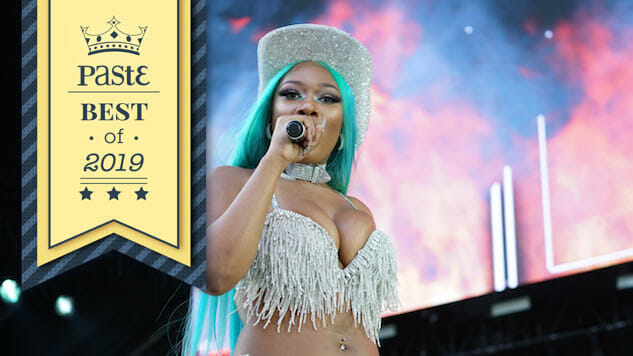
Many have viewed 2019 as a slow year for hip-hop because a lot of the genre’s biggest, most trusted heavy-hitters didn’t release albums—or at least not good ones (looking at you, Kanye and Chance The Rapper). But that doesn’t mean we should discount 2019 altogether. Like other sectors of music, hip-hop was experiencing transition. Elder statesmen stepped out to make room for a slate of exciting new acts, many of whom—like Megan Thee Stallion and Little Simz—shook up the culture in the process. Some of hip-hop’s most critically adored but perhaps commercially underrated figures like Danny Brown and Freddie Gibbs also returned with noteworthy releases. Maybe 2019 wasn’t exactly the most stacked year for hip-hop releases this decade, but it was certainly a good one. And we may just be getting a glance at hip-hop’s next generation of greats. Here are our favorite hip-hop and rap records of the year, ranked.
Listen to our Best Hip-Hop Albums of 2019 playlist on Spotify right here.
 10. Freddie Gibbs & Madlib: Bandana
10. Freddie Gibbs & Madlib: Bandana
“Situations,” a track from Freddie Gibbs’ and Madlib’s second collaborative album Bandana, samples one Thaddeus Matthews, aka the “Cussing Pastor” who rose to fame in a 2018 Instagram video. “Fuck You Friday was such a great holiday that I thought I would extend the holiday season, and let’s call it ‘I Don’t Give A Shit Saturday,’” he says. Gibbs, one of the preeminent contemporary gangsta rappers, and Madlib, an ultra-serious experimental beatmaker, may not seem like the two best messengers for a “we all need to lighten up and have fun” sort of decree, but Bandana proves otherwise. Smoother and more relaxed than ever, the duo, while still exploring favorite topics like drug deals gone wrong and police brutality, dare us to loosen up and enjoy ourselves on our own “I Don’t Give a Shit Saturdays.” Though the Matthews sample may sound out of place at first on “Situations,” a song about gang life and murders, it actually makes complete sense that the duo would use it here, pushing us all to live our lives to the fullest despite the hands we’ve been dealt. Freddie Gibbs and Madlib are two of the best at their individual crafts, both involved in some of the best hip-hop records and singles of the past decade plus. Their styles couldn’t be more different, but if Bandana and Piñata are any proof, they’re truly best when working together, especially in the same room. —Steven Edelstone
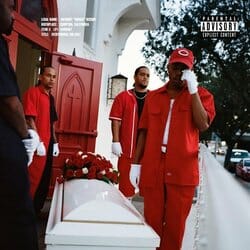 9. Boogie: Everythings for Sale
9. Boogie: Everythings for Sale
Though Everythings for Sale is his major label debut, it feels like we’ve been growing up with Anthony Dixon for years now. Many of his preoccupations still hold steady since his first mixtape, 2014’s Thirst 48—sincerity as suicide, or maybe not, it hardly matters, nothing matters, what matters?—and one can draw a line, aimed ever inward, from that release’s opus, the sprawling, simple “Bitter Raps,” to this album’s opening, “Tired/Reflections.” Where once he listed his many grievances, both socially and professionally (“I hate how every LA rapper try to sound like YG / Like, be creative”), always admitting his hypocrisy (“I’m probably on the same thing”), in 2019 he censures himself: “Ain’t you tired of telling it? / Ain’t you tired of not being relevant? / Ain’t you tired of talking ‘bout your ex and your relative and digging up skeletons?” Yes, he admits, he is tired, but he’s always been this way. So it goes that his first album on Eminem’s Shady Records, more than two years in the making, bears much of the mood of everything to come before. Boogie’s beats are nothing if not quietly cinematic: “Silent Ride” moans with woodwinds, as if he’s watching his hometown of Compton fall asleep, and “Whose Fault” glistens beneath the clarion sound of a trumpet, crying itself into the night. Both are produced by Keyel, who, with fellow producer Dart, has been working with Boogie since his second mixtape, The Reach, but now with big studio backing, they’ve never felt more in tune with the ineffable anxiety Boogie’s been trying to put words to since he started. “Silent Ride” is just that, the man stuck with his thoughts, attempting to reconcile, “I love to lie, I’m extra’d out / I know I’m wrong but let me slide / If I ain’t right before I rise / Tell the world I’m dead inside.” “Whose Fault”—it’s always his, especially when he takes on the perspective of his partner, his voice cracking as he channels, “Shoulda left you where you stand / Shoulda never let you hit, I shoulda chose up on your friend / Wish your daddy was around and taught you how to be a man.” Maybe it’s ironic that Boogie owes Eminem his loftier platform; whereas the Detroit rapper’s bitterness often comes off as performative, we believe Boogie when, on the horrorcore-lite “Self Destruction,” he confesses, “’Til the time I fuck a singer, I can’t say that I’m that guy / Like that night I drunk text SZA then got hot she ain’t reply.” He’s a man hyper-aware of consequence, a quality just as rare in pop music now as it was seemingly a lifetime ago. —Dom Sinacola
 8. Clipping.: There Existed an Addiction to Blood
8. Clipping.: There Existed an Addiction to Blood
Far from fiction, Clipping.’s latest album, There Existed an Addiction to Blood, turns the framework of horror on its head. Fear runs rampant across each track, but instead of channeling nightmares through imagination, the L.A. experimental hip-hop trio show us the terrifying nature of our own kind. There Existed an Addiction to Blood is the deranged culmination of everything Clipping. have been experimenting with—but not quite nailing down—over their previous two albums. Here, they’ve given their most focused project, all while exploring the darkest corners of humanity over envelope-pushing industrial production. With a carefully constructed chaos, Clipping. throw us into their torturous musical realm and boldly ask us to find the art in fear. —Hayden Goodridge
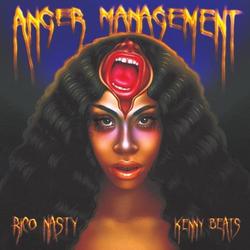 7. Rico Nasty & Kenny Beats: Anger Management
7. Rico Nasty & Kenny Beats: Anger Management
Last year, the Washington D.C.-based rapper Rico Nasty released one of 2018’s wildest and most wonderful rap albums: Nasty was at least her fourth full-length release, but it really felt like the rapper’s introduction to the world—and ours to the bright, loud world inside her head. At only 21, Nasty dropped a fast-paced, multifaceted experiment with a wide range of styles that sounded like the musical version of frantically trying on different outfits in a vintage shop. Anger Management, her 2019 mixtape with friend and Nasty producer Kenny Beats, is a little tighter, but it goes just as hard—if not harder. It’s so short—clocking in at just shy of 19 minutes—that if you tune out for a few bars, you might just miss something. Rico Nasty remains one of the most aggressive rappers in the game, yet she stretches and elongates her voice throughout this record, showing the potential for more melodic verses. But for most of the 18 minutes, she’s spitting straight fire. It’s exactly what its title might suggest: a livid, charged flare-up, like an outburst of outrage tempered in the studio. Or, as Kenny Beats tweeted on release day: “ITS LIKE A TEMPTER TANTRUM.” He was right about another thing, too: This is a mixtape rapped in all-caps. —Ellen Johnson
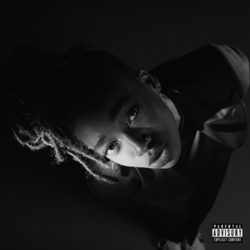 6. Little Simz: GREY Area
6. Little Simz: GREY Area
Little Simz (born Simbiatu Abisola Abiola Ajikawo) has been one of the U.K.’s most consistent rappers in the years of late, and she deservedly soaked up more of the spotlight for her Mercury Prize-nominated full-length GREY Area. GREY Area thrives in the extremes—her smooth subtlety and forceful venom are equally potent. Taking cues from jazz, funk, grime and soul, Little Simz knows when to pull a punch or go for the kill-shot. She gets her power from her inspiring self-belief that’s sprinkled all over her lyricism. “I’m Jay-Z on a bad day, Shakespeare on my worst days,” she spits on opening track “Offence,” while on the synthy bouncer “Boss,” she beams, “See God when you look me in my eyes.” Seamlessly blending in features from Cleo Sol, Chronixx, Little Dragon and Michael Kiwanuka, GREY Area is a more vigorous brand of self-love than we’re used to hearing, but her adroit wordplay and fearless delivery make it feel more like lionhearted uplift than chest-puffing bombast. —Lizzie Manno
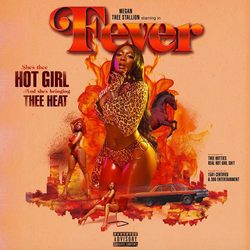 5. Megan Thee Stallion: Fever
5. Megan Thee Stallion: Fever
Houston rapper Megan Thee Stallion is an icon in the making, a force majeure in the lineage of Houston rap. Fever, her first official mixtape, maintains the high-octane rap of her earlier work, all delivered with a sneer and a smile. Don’t let the appropriation of “hot girl summer” by the (largely-white) powers that be overshadow her relentless, braggadocio-filled raps, aided by Houston’s finest: Hot Girl Meg lays out her M.O. on the Juicy J-produced album highlight “Pimpin”: I could never ever let a n—- fuck me out my bread.” She knows she’s good, she’s unsympathetic to the guys who are intimidated, threatened and broke, and she makes that evident throughout Fever. Even at her most party-ready, like on the delightful DaBaby double-feature “Cash Shit,” the hot girl anthem “Shake That,” or “Best You Ever Had,” a crossover track in waiting, she makes her point and underlines it: Either keep up, or get out of the way. —Joshua Bote
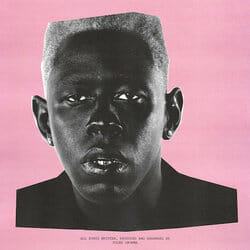 4. Tyler, The Creator: IGOR
4. Tyler, The Creator: IGOR
On “IGOR’S THEME,” the opening track on Tyler’s highly anticipated follow-up to Flower Boy, he shows that even with the heightened expectations, he can still surprise us. Relying on heavy, ominous low synth tones and complex percussion—a combination that’s featured prominently throughout the album—the mainly instrumental song is a bit of a change-up from his past work, essentially combining the best aspects of Cherry Bomb with the emotionality and relative absence of Tyler’s rapping presence on Flower Boy to create a hangover record of sorts from the flamboyance of his last record. Perhaps the Yeezus to Flower Boy’s My Beautiful Dark Twisted Fantasy, he continues to push the themes of loneliness and his inability to be fully loved found on his previous record, only this time largely twisting the knobs in a louder and darker direction. Tyler warned us to not “go into this expecting a rap album,” but some of the best tracks on IGOR are when he does give into these tendencies. The slowthai-aided “WHAT’S GOOD” largely follows suit, proving that he can make hard-hitting hip-hop better than almost anyone else. —Steven Edelstone
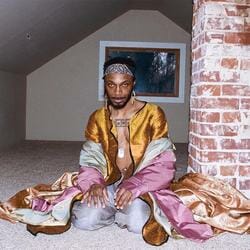 3. JPEGMAFIA: All My Heroes Are Cornballs
3. JPEGMAFIA: All My Heroes Are Cornballs
JPEGMAFIA dropped one of the year’s most off-kilter and fun rap albums of the year out of the blue in September. On the first listen, it feels a bit discombobulated, even disconnected. But upon repeated listens, the pieces start to come together, miraculously so. The Baltimore rapper’s signature wild production and sound effects, which span voiceovers, static and warps, mesh with his intense delivery to a satisfying end. All My Heroes Are Cornballs toggles between ambience and hi-fi insanity. Highlights include the riotous album opener “Jesus Forgive Me, I Am A Thot,” in which JPEGMAFIA plays with AutoTune and shouts out David Byrne, the low-key “Free The Frail,” which hosts Canadian musician Helena Deland for the final chorus and outro, and the minute-long “BasicBitchTearGas,” which features a smooth sample of TLC’s “No Scrubs.” If it wasn’t already apparent, this album proves JPEGMAFIA’s musical knowledge and influences are broad. All My Heroes is a glitchy, neon-tinted journey. —Ellen Johnson
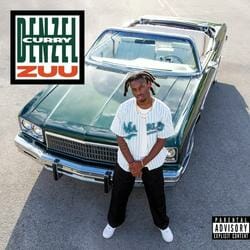 2. Denzel Curry: ZUU
2. Denzel Curry: ZUU
With no context for the South Florida that Denzel Curry synopsizes and crystallizes over the course of ZUU, his fourth and best album, it may be difficult to parse the neck-deep morass of references and samples—detailing hyper-local haunts and Miami radio stations and communal pop culture heroes (Trick Daddy) and personal pop culture tragedies (XXXTENTACION) and whatever else—that makes Curry stump so hard for where he’s from. He’s always been adept at pulling from a wealth of influences, last year’s Ta13oo an especially labored-over attempt at being taken seriously, but only lately has he seemed comfortable in his skin, rapping about loving his supportive parents and missing his best friend and brother and how no one taking him seriously has just been the response to everything he’s done, an endless cycle of doubt he’s endured since “way before Nostalgic,” his first solo tape. Backed by Australian production duo FnZ, who’ve been with Curry since 2016’s Imperial, ZUU is both the sound of Curry finding his, and the sound of Curry’s main collaborators finally realizing what that means. First single “RICKY” admits Curry’s had an identity crisis in the past—“That was it, we was lit, y’all wasn’t even shit yet / We was Three 6, Wu-Tang, mixed with Dipset”—over FnZ’s stippling, phased-out steel drums, simultaneously laid back and flipped out. “CAROLMART” undoubtedly helps Ice Billion Berg with some debt, all low-end muck spiced up with a Trina sample, sitting right up against the relentless “SHAKE 88,” a minor masterpiece of involuntary, transcendent movement, the kind of song that generates so much inertia it’s a wonder that all of South Florida hasn’t vibrated itself free of the mainland. Even “Speedboat,” produced by Rahj—known mostly for working with DJ Khaled—is at the mercy of FnZ’s oversight, as mournful as it is manic as it is insanely melodic, Curry acting the paranoiac over a melancholic piano line: “Have your money up before you go to war / Put the mask on like a luchador / My dawg didn’t make it to 21, so I gotta make it past 24.” (He really misses XXXTENTACION, you see.) Intimate but open, angry and also easy-going, breezy but weighed with the responsibility of representing a lot of people, ZUU takes all the overworked contradictions that made Curry’s past albums so compelling and makes them work for him, effortlessly. —Dom Sinacola
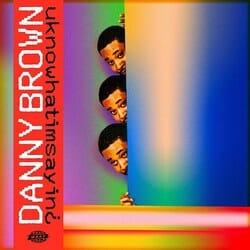 1. Danny Brown: uknowhatimsayin¿
1. Danny Brown: uknowhatimsayin¿
Danny Brown always seemed immortal. His trilogy of critically acclaimed releases—2011’s incendiary XXX, 2013’s decadent Old and 2016’s staggering prog-rap opus, Atrocity Exhibition—found the Detroit MC repeatedly self-destructing, masquerading the references to his childhood traumas with an infinite supply of party pharmaceuticals and charisma. Every time he sounded like he was truly on the brink, he’d return, and usually messier, drunker, funnier. His music got better. He was invincible. Maybe. It’s a relief that Brown sounds mortal on his new album, uknowhatimsayin¿. He sounds healthy, if in a high-cholesterol way. He looks it, too—watch his new talk/sketch comedy show, Danny’s House, and you’ll be presented with a nearly unrecognizable figure, complete with a malleable gut, a newly-complete set of pearly whites and an unpretentious fade. He looks like he’s about two shakes away from buying a convertible and getting a divorce. While no song sounds the same, they all exude a similar meditative energy, a far cry from the manic bombast that, to this point, defined the rapper’s discography. There are no bangers on the album, but there aren’t any sleepers either; fans that just want a XXX 2 will likely be disappointed. On the album’s superb title track—a Y2K-reminiscent downtempo groove—Brown sounds like he’s finally broken out of the cycle that once made his music so intoxicating. It’s a departure, but a vital one. “If it wasn’t for that, wouldn’t be this / Know what I’m sayin’?” —Harry Todd
Listen to our Best Hip-Hop Albums of 2019 playlist on Spotify right here.







































